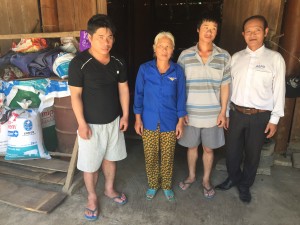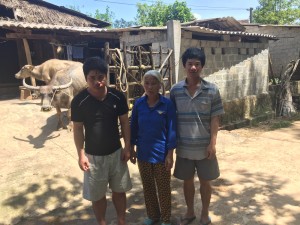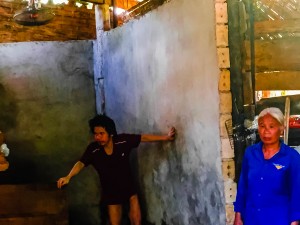
From left: Mai Thi Loi’s youngest son, Hung; Mai Thi Loi; Mai Thi Loi’s fourth son, Cuong; Truong Minh Hoc, AEPD outreach worker
As we set out from Dong Hoi for our first two family visits, I’m both excited to start meeting the people I’m here to serve and somewhat nervous, uncertain of what to expect from these encounters. I’m accompanied by Truong Minh Hoc, one of AEPD’s outreach workers (and himself a disabled veteran of the American War); Dat, our Advocacy Project associate; and Ngoc, another AEPD staff member who interprets for me.
Mai Thi Loi and her family live in a remote village in Tuyen Hoa District, a 2 ½-hour drive from Dong Hoi through imposing mountains and lush valleys. The village lies in the “frontier area” near the Laotian border; we are required to check in with the local government when we arrive, and are joined by a police officer for the visit.
Mai Thi Loi greets us as we arrive. She is an elderly woman, but seems strong and healthy. We enter her home, a relatively small, dark wooden house with a corrugated metal roof, and sit around a table in her living room.
Mai Thi Loi’s story has been covered very well by previous AP fellows, so I won’t go into too much detail here. Nguyen Van Tri, Mrs. Loi’s late husband, was exposed to Agent Orange while serving in the North Vietnamese military during the American War, and would eventually die of the resulting complications in 1989. Their children were born healthy, and the first two have avoided ill effects—they’re both married and live on their own—but Kien (who is now 33), Cuong (now 31) and the youngest, Hung (now 29) became more and more mentally disturbed as they grew up, often wandering around the neighborhood and prone to fits of anger. None of the three have been able to go to school past the second grade, or to work outside the home, and Mrs. Loi must care for them on her own. Last year, thanks to AP’s generous donors, we were able to acquire a new buffalo for Mrs. Loi’s family, and I’m mainly here to check in with them about how things are going.
Cuong and Hung are able to sit with us at the table, but neither of them speaks more than a couple of words, and although much of the conversation is about them they don’t have any visible reaction to it. I wonder how much of it they’re able to understand.
During our visit, another man peers out at us from an enclosure in the next room—this is Kien, the oldest son. Kien “cannot control his mind, he can’t recognize his mom or anyone else around him,” Ngoc tells me. When Kien was 13, Mrs. Loi was forced to chain him to the wall of his room to prevent him from destroying the house or hurting others—he has now been confined for twenty years, since Mrs. Loi has no other way to care for him while protecting her home and herself. I knew to expect this, but to see it in person still comes as a shock. As I talk with Mrs. Loi Kien will occasionally shout some words (which I, of course, can’t understand) from the other room; everyone else seems used to this, since they don’t react to Kien’s outbursts. “He doesn’t know what he’s saying,” Ngoc tells me.

From left: the family’s buffalo calf, the full-grown buffalo (Opportunity), Hung, Mai Thi Loi and Cuong.
Mrs. Loi has both good and bad news to share with us. The good news is that the family’s buffalo remains in good health and has benefited her and her family. “The buffalo is developing very well,” Mrs. Loi says, and helps her work the fields on her farm; she also rents the buffalo out to other families. Mr. Hoc tells me that the buffalo can bring in 70,000 Vietnamese dong (around $3) per day, which has greatly improved the family’s financial situation. The buffalo—which gave birth to a calf soon after Mrs. Loi got it—has been especially helpful in the wake of a devastating flood last October, which spared her home but destroyed her cornfields. With no harvest this past year, the family was even more dependent on the buffalo as a source of income.
Thanks to the buffalo, Mrs. Loi says, she’s been able to bring Hung, her youngest son, to the nearest hospital in Dong Hoi for treatment each month (though this is still a significant cost)—Hung, she says, has been getting “better and better” ever since. Iain, AP’s director, had reported that Hung was chained up with Kien when he visited—Hung couldn’t leave the house, ripped his clothes, and was prone to violent rages. Now Hung is able to dress himself, go outside, and perform basic household chores.
The bad news, Mrs. Loi tells us, is that Kien and Cuong have not improved with their brother, and their condition is “not good at all.” The hot summer weather seems to make Kien even worse. At this point, I see another man, apparently a neighbor, enter the next room and start hosing down Kien; we all try to avoid acknowledging this while it happens.
Mrs. Loi is particularly worried about Cuong, who is getting “worse and worse”; he can walk, talk, and control his mind most of the time (as is the case during our visit), but he loses control more and more frequently. Mrs. Loi says she believes that “sometime in the future he will become like that”—Ngoc points at Kien, chained up in his room, as she translates these words, and I feel myself shiver slightly.
The main challenge facing the family now is finding medical treatment for the sons. Mrs. Loi can afford, barely, to take Hung for treatment thanks to the money generated by her buffalo, but she’s unable to afford medicine for Cuong or proper treatment for Kien.
Mr. Hoc explains that there is a new mental hospital under construction in Dong Hoi, but nobody is sure when it will be complete. Mrs. Loi says she’s hoping to transfer Kien to the hospital when it opens—the doctors and nurses would be able to provide more effective care for him, and Dong Hoi is close enough that Mrs. Loi could still visit. But this would be very expensive, she says, and she can’t afford it without selling the buffalo. She hopes for more support to buy a cow, which she could rent out to earn more money to treat Kien and Cuong; I can only tell her that I’ll let AEPD and AP know of her needs.
I’m reminded of an observation made by Ai, my predecessor, in a previous visit with Mrs. Loi—her story isn’t “a triumphant story of success,” but an example of one woman doing what she can to live with a horrific situation. She certainly seems in better spirits than Ai described, but I can tell from her words that her life is still full of struggle. A buffalo, while undoubtedly helpful, isn’t a “solution” to the problems caused by Agent Orange, it just makes it a bit easier to cope.
I ask Mrs. Loi about the support she’s gotten from her community and her family, and she’s quick to express gratitude from the support her family has received. The community is “very caring,” she says, and neighbors and relatives often come by to help with household chores and taking care of Kien, and will pitch in in other ways—providing rice when food is scarce, helping to take Hung to the hospital, things like that. But this is one of the poorest areas of Vietnam, and people only have so much to give. Mr. Hoc tells me that this family is at the top of the local government’s list to receive benefits, but, again, these are often scarce. The government did provide much-needed support after last year’s flood, though, connecting her to a donor in Ho Chi Minh City that helped sustain her family after the harvest was destroyed.
I shake hands with Mrs. Loi as we conclude our conversation. I feel like there’s something I should say here, words that could help somehow—but these don’t come to mind, so instead I simply thank her and say that I hope to return. We take photos of Mrs. Loi, Cuong and Hung with their buffalo and calf, who look as healthy as advertised.
Finally, with Mrs. Loi’s permission, I return to the house to photograph Kien. I see him more clearly than in the living room—he stands by the concrete wall of his room, wearing only a ragged-looking shirt. He certainly knows we’re there, but I can’t gauge his reaction as I take my pictures and leave.
Posted By Jacob Cohn (Vietnam)
Posted Jun 26th, 2017


